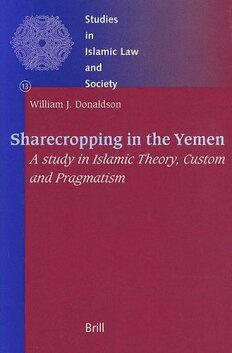
Sharecropping in the Yemen: A Study in Islamic Theory, Custom and Pragmatism (Studies in Islamic Law and Society) (Studies in Islamic Law and Society) PDF
297 Pages·2000·12.325 MB·English
Most books are stored in the elastic cloud where traffic is expensive. For this reason, we have a limit on daily download.
Preview Sharecropping in the Yemen: A Study in Islamic Theory, Custom and Pragmatism (Studies in Islamic Law and Society) (Studies in Islamic Law and Society)
Description:
This volume discusses sharecropping in the Yemen against the background of Islamic law and customary law. Sharecropping is particularly interesting in Islam since its basis (rent as a proportion of an unknown future harvest) is ostensibly inconsistent with the Islamic prohibition against transactions involving gharar (risk or uncertainty). The first half of the book analyzes how Islamic theory views sharecropping and is based on a detailed analysis of key legal texts, while the second half focuses on sharecropping as it exists in practice in the Yemen. Textual sources (Islamic legal texts, contracts, pleas and fatwas are related throughout to Yemeni sharecropping in practice, and the work has been written so as to be accessible to both social scientists and to Islamic legal specialists.
See more
The list of books you might like
Most books are stored in the elastic cloud where traffic is expensive. For this reason, we have a limit on daily download.
